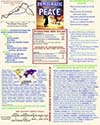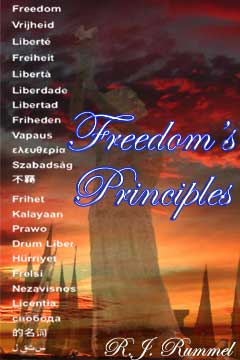Below I give the link to the most recent libertarian attack by James Ostrowski on the idea of the democratic peace, and response by Colleague. If submitted by as a student term paper, it would be graded an F by both of us.
This raises the question as to what it is with the libertarian anti-interventionists that they cannot mount an even reasonable critique of the democratic peace. Is it that they are stupid? No, these are often intelligent people who have mastered a profession in their own right. Ostrowski, for example, is an attorney, and has written Political Class Dismissed. He also has an interesting and useful website at HYPERLINK “http://jimostrowski.com” http://jimostrowski.com. These people have to be taken seriously, and Colleague and I do so.
Then what? At the heart of their problem is that they are unfamiliar with the nuances of international relations, and in particularly, with the research on the democratic peace. In other words, they are largely ignorant of the field and idea on which they write.
Also, there is more to the idea of the democratic peace than just reading books about it. It comes out of the scientific study of international relations and war, so to get the best handle on it, one must have some familiarity also with quantitative methods, particularly statistics (although my approach is generally mathematical). So, for example, using multiple regression, reseachers have found that even holding many possible causes of violence constant, the more democratic a government, the less severe its foreign violence. This statement requires some understanding of the method of multiple regression, the meaning of “holding constant,” and the empirical content of “democracy” and “severe violence.” From one study to the next, these terms are defined by explicit data collections.
I want to be clear on this. I am not saying that the democratic peace is such an esoteric idea that only a specialist can understand and critique it. This is not quantum physics. It is most akin to quantitative economics. I am saying that one must familiarize themselves with the writing in this field to critique it adequately, and there are enough “common sense” reviews and summaries to do this (I will discuss a comprehensive bibliography this week— link here).
Because of the technical nature of this research on the democratic peace (within the field of quantitative international relations), even those trained in international relations, such as in national security studies, or diplomacy sometimes misunderstand the work on the democratic peace. But, there are good critiques, and there are those who have become knowledgeable in the research and disagree with it. Not one, however, is a libertarian.
Link of Note
”The Myth of Democratic Peace: Why Democracy Cannot Deliver Peace in the 21st Century” (2/19/05) By James Ostrowski
From Colleague
Colleague is a PH.D, did his dissertation on the democratic peace, and teaches international relations.
Ostrowski’s essay was intensely frustrating :
He does not seem to understand the INTER-democraticness that is the core of the theory and empirical findings of no war between democracies.
He critiques “democratic pacifism” as distilled from a variety of sources, sketched out as:
democracies rarely if ever go to war against each other; democracies tend to be more peaceful than dictatorships; democracies tend to have less internal violence; and this tendency toward peacefulness is structural, that is, related to the nature of democracy, not an accident or coincidence.
This sounds like it might be “democratic peace,” and includes some of its propositions, but drags in others that really cloud things up, such as “democracies tend to be more peaceful,” and veers off into explanations of WHY the democratic peace is so. Why didn’t he undertake to critique the standard five propositions set forth in the very book by Rummel he attacks (Power Kills [link here]). I’d be much more willing to read his research if he walked me through why each of those five propositions were in error.
Some of his statements are flat-out ignorant. He says that the main threat to world peace is not war between two nation-states, but nuclear arms proliferation. Sounds smart, but consider that no democratic states with nukes feel threatened by other democratic states with nukes. And all states feel threatened by non-democratic states with nukes. Regime type matters. His second level of threat is terrorism. Yup. And what democracy is exporting terrorism? What terrorist group espouses democracy? None. Again, regime type matters. His final level of threat is internal ethnic-religious conflict. It sure is a problem, but what is the most reliable possible solution to such conflict — meaning how can such conflict be kept from breaking out in widespread violence? He cites Afghanistan — well, is sure seems like the arrival of democracy there (albeit in its infancy) has reduced the murderous type of violence practiced by the dictatorial Taliban. Again, he should repeat after me…Regime Type Matters.
His data is nonsensical and irrelevant.
Example 1: listing “Wars of the Democratic Powers” tells me absolutely nothing about whether democracies fight each other. He seems to have completely missed the very idea of regimes types and dyads. Also, where is the comparison list of “Wars of the Nondemocratic Powers”?
Example 2: listing nuclear powers by type of government tells me nothing. It’s like identifying a rapist and a chef as both having a knife in his hand. So what?
Example 3: “Recent Intrastate Conflicts” makes no mention at all of the severity of the internal conflict, nor of changes in government, nor of what years these conflicts occurred. I have no idea what I’m supposed to understand from this list.
Example 4: the chart of homicide rates that has only one “dictatorship” listed against which to compare many democracies. And that dictatorship — with the lowest rate on the list — is tiny little Singapore. What about the 80 some non-democracies in the world? What about the world’s most repressive regimes (Burma, China, Cuba, Equatorial Guinea, Eritrea, Laos, North Korea, Saudi Arabia, Somalia, Sudan, Syria, Turkmenistan, Uzbekistan, Vietnam….)? What the hell am I supposed to get from this chart?
Example 5: counting deaths of one’s own soldiers in war as democide. Conceptually this is like counting beans as steaks. It makes no sense, but even if we were to accept this definition, why only count U.S. war deaths? If what we are after is comparing kinds of governments, then even a modicum of intellectual integrity would call for looking at the own-soldiers deaths of other governments, especially non-democratic ones. Does Ostrowski not do this knowing that it will only show that democracies suffer fewer casualties that non-democracies? Gee, that is one of Rummel’s five propositions, unmentioned by Ostrowski.
Example 6: Ostrowski concludes with a nice little chart rank-ordering regimes by their peacefulness. We discover that “self-government” is the most peaceful, followed by “republics” then democracy. Nowhere in any of his data charts could I find ONE example of a “self-government” or a “republic.” What the hell are these things — in the real world where we try to get data to understand reality? The closest example I can think of to his definition of “self-government” is Somalia, where there is indeed no state with final authority, and each person governs himself…except that people also tend to govern anyone else they can wield power over. With nothing to prevent warlords, this isn’t exactly what I’d want to hold up as a “peaceful” society.
Lacking any data at all to support his assertions, I can only conclude that the essay is groundless, directionless, unrigorously speculative, lacking definitional integrity, etc. This isn’t even high-school level “research.”
I’m torn about these libertarians: I have an intense affinity for them because of their love of freedom…but I despair for them for their almost callous lack of scholarship, their arrogance, and their apparent inability to understand even basic points about international politics. For example, Ostrowski’s point about counting own-soldier deaths as democide. It has a certain appeal, from the perspective of an anti-statist. But the complete lack of comparative perspective (who kills more of their own soldiers by ordering them off to war?) negates even the possibility of scholarship. And ultimately their “project” fails because it is not practical. Not “impractical” in the sense of too hard to do, but impractical in the sense that it has an inaccurate view of humanity. In the long run, their work does not contribute to making anything better, whether that be understanding ourselves, or achieving peace. So, I keep asking myself every time I read their stuff, or visit their Web sites — why do I waste my time? Perhaps I hope they will see the light…. so far though, only murky darkness….



 Posted by rudyrummel
Posted by rudyrummel 






